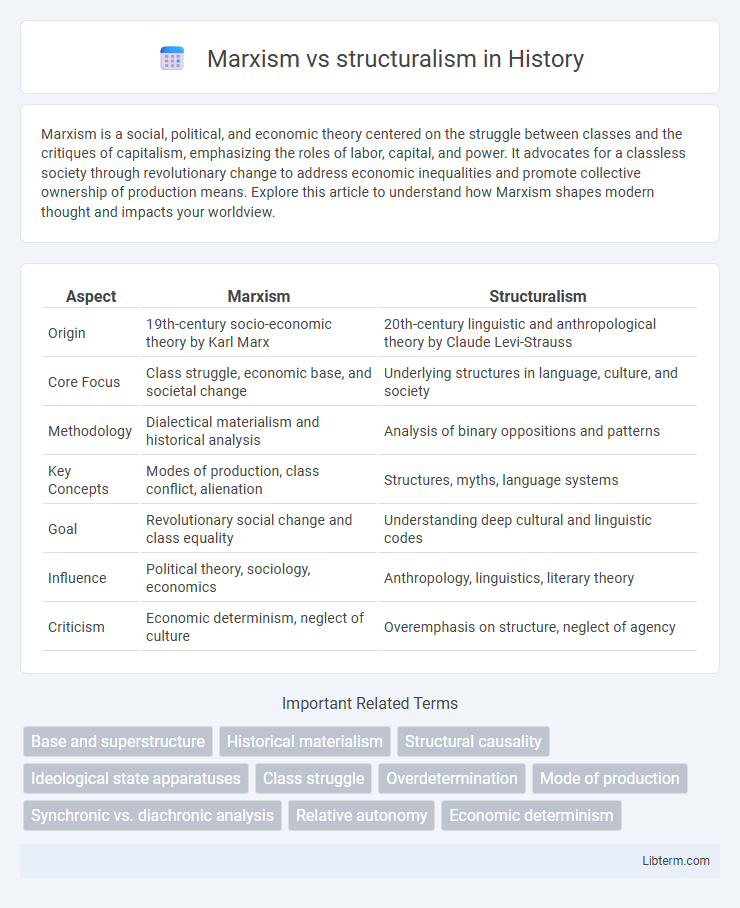Marxism is a social, political, and economic theory centered on the struggle between classes and the critiques of capitalism, emphasizing the roles of labor, capital, and power. It advocates for a classless society through revolutionary change to address economic inequalities and promote collective ownership of production means. Explore this article to understand how Marxism shapes modern thought and impacts your worldview.
Table of Comparison
| Aspect | Marxism | Structuralism |
|---|---|---|
| Origin | 19th-century socio-economic theory by Karl Marx | 20th-century linguistic and anthropological theory by Claude Levi-Strauss |
| Core Focus | Class struggle, economic base, and societal change | Underlying structures in language, culture, and society |
| Methodology | Dialectical materialism and historical analysis | Analysis of binary oppositions and patterns |
| Key Concepts | Modes of production, class conflict, alienation | Structures, myths, language systems |
| Goal | Revolutionary social change and class equality | Understanding deep cultural and linguistic codes |
| Influence | Political theory, sociology, economics | Anthropology, linguistics, literary theory |
| Criticism | Economic determinism, neglect of culture | Overemphasis on structure, neglect of agency |
Introduction to Marxism and Structuralism
Marxism centers on class struggle, economic base, and historical materialism, emphasizing how capitalism shapes societal structures through the conflict between bourgeoisie and proletariat. Structuralism analyzes underlying systems and structures in language, culture, and society, focusing on relationships and patterns rather than individual agency. Both frameworks seek to understand social phenomena but diverge in methodology: Marxism foregrounds economic and class dynamics, while structuralism prioritizes systematic structures and binary oppositions.
Historical Development of Both Theories
Marxism emerged in the 19th century, founded by Karl Marx and Friedrich Engels, emphasizing class struggle and economic determinism as drivers of historical change. Structuralism developed in the mid-20th century, notably shaped by Claude Levi-Strauss and Ferdinand de Saussure, focusing on underlying structures in language, culture, and society that shape human experience. Both theories evolved through interdisciplinary debates, influencing social sciences and humanities by challenging traditional individualistic and linear historical narratives.
Core Principles of Marxism
Marxism centers on the core principle of class struggle, emphasizing the conflict between the bourgeoisie and proletariat as the driving force of historical change. It advocates for the analysis of socio-economic structures through the lens of material conditions and modes of production, highlighting issues of exploitation and capitalist domination. Marxism proposes the eventual overthrow of capitalist systems to establish a classless society based on common ownership of the means of production.
Key Tenets of Structuralism
Structuralism emphasizes the underlying structures that shape culture, language, and society, focusing on binary oppositions and the interrelations of elements within a system. It asserts that meaning is generated through the differential relationships between signs, rather than through individual agency or historical context, contrasting with Marxism's emphasis on class struggle and economic determinism. Key proponents like Ferdinand de Saussure and Claude Levi-Strauss highlight language and mythology as systems governed by rules that shape human experience and social organization.
Differences in Understanding Society
Marxism interprets society through the lens of class struggle and economic relations, emphasizing material conditions as the foundation of social structures. Structuralism analyzes society by uncovering underlying systems, such as language and culture, that shape human behavior and social relations independently of economic factors. While Marxism prioritizes historical change driven by economic forces, structuralism concentrates on the synchronic study of societal structures that influence individual actions and social meanings.
Role of Economics and Structure
Marxism emphasizes economics as the foundation of social structures, highlighting class relations and material conditions as key drivers of societal change. Structuralism focuses on underlying systems and linguistic or cultural structures that shape human experience, often downplaying economic factors. While Marxism centers on economic determinism, structuralism prioritizes abstract systems and signifying structures as the primary forces influencing social dynamics.
Influential Thinkers: Marx vs. Levi-Strauss
Karl Marx, the founder of Marxism, emphasized economic class struggle and historical materialism as the driving forces behind societal change, advocating for the working class's emancipation from capitalist exploitation. Claude Levi-Strauss, a key figure in structuralism, focused on uncovering the underlying structures of human thought and culture, particularly through binary oppositions and myths across diverse societies. While Marx analyzed social relations through the lens of production and power dynamics, Levi-Strauss prioritized cognitive patterns shaping cultural phenomena independent of economic factors.
Approaches to Culture and Ideology
Marxism interprets culture and ideology as reflections of the economic base, emphasizing class struggle and material conditions as determinants of social consciousness. Structuralism analyzes culture and ideology through underlying systems and binary oppositions, focusing on how meaning is constructed independently of individual intentions. Both frameworks explore how power and social structures shape cultural phenomena, but Marxism centers on economic relations while structuralism prioritizes linguistic and cognitive structures.
Criticisms of Marxism and Structuralism
Criticisms of Marxism highlight its economic determinism and reductionism, often overlooking cultural and ideological complexities beyond class struggle. Structuralism faces criticism for its abstract models that can neglect historical context and human agency, leading to rigid interpretations of social phenomena. Both approaches are challenged for their potential to simplify intricate social dynamics and marginalize alternative explanatory frameworks.
Contemporary Relevance and Applications
Marxism remains influential in analyzing class struggles, economic inequalities, and capitalist systems within contemporary social and political movements, guiding critiques of neoliberal policies and global capitalism. Structuralism continues to shape modern linguistic theory, anthropology, and cultural studies by emphasizing underlying structures in language, myths, and social practices that influence human behavior and societal organization. Both frameworks provide valuable tools for understanding power dynamics and cultural phenomena in disciplines such as sociology, literary theory, and political science.
Marxism Infographic

 libterm.com
libterm.com